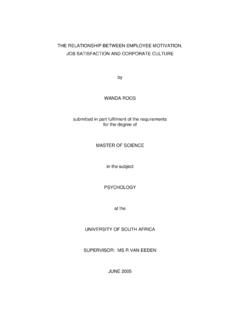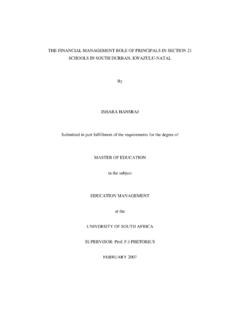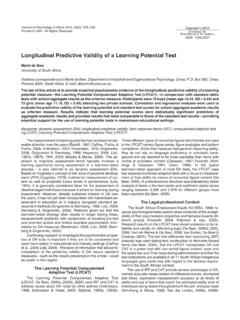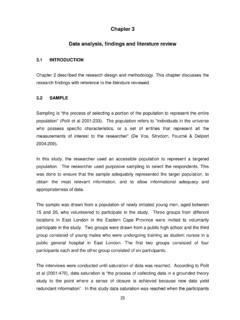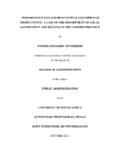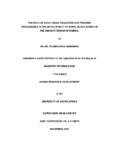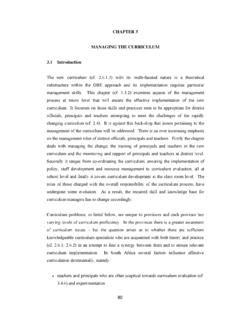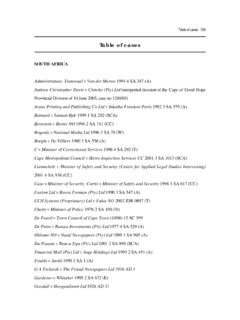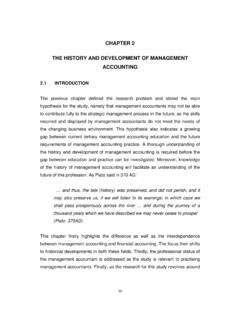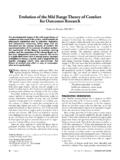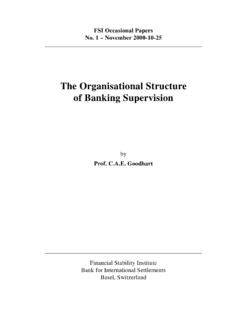Transcription of THE EVOLUTION OF STATE SOVEREIGNTY: A HISTORICAL …
1 _____ THE EVOLUTION OF STATE sovereignty : A HISTORICAL overview * MP Ferreira-Snyman** 1 Introduction 1 1 Defining sovereignty The idea of absolute sovereignty is in many respects an outdated concept in modern international law and there are various factors contributing to its erosion. As a result of especially globalization, there is a growing trend of interdependence and co-operation between states . The sovereignty of states , therefore, continues to be limited by, for example, the internationalization and universalization of human rights.
2 Although STATE sovereignty is a fundamental principle of international law,1 the precise meaning of the term sovereignty is not clearly The following possible definitions of sovereignty have been offered: sovereignty is the most extensive form of jurisdiction under international law. In general terms, it denotes full and unchallengable power over a piece of territory and all the persons from time to time * This contribution is based on research done for the author s PhD thesis, entitled The Erosion of STATE sovereignty in Public International Law: Towards a World Law?
3 , for which she is currently registered at the University of Leyden in The Netherlands. ** Senior Lecturer, Department of Jurisprudence, University of South Africa (BIuris LLB LLM (PUCHE)). 1 Perrez Cooperative sovereignty from Independence to Interdependence in the Structure of International Environmental Law (2000) 13 explains the importance of sovereignty in international law as follows: It is argued that international law is based on the principle of sovereignty , that sovereignty is the most important if not the only structural principle of international law that shapes the content of nearly all rules of international law, that the international legal order is merely an expression of the uniform principle of external sovereignty , that sovereignty is the criterion for membership in the international society.
4 And that sovereignty in sum is the cornerstone of international law and the controlling principle of world order . 2 Oppenheim International Law: A Treatise Vol 1 (Arnold D McNair (ed) (1928)) 137 notes that there exists perhaps no conception, the meaning of which is more controversial than that of sovereignty . It is an undisputable fact that this conception, from the moment when it was introduced into political science until the present day, had never had a meaning which was universally agreed upon.
5 Henkin International Law: Politics and Values (1995) at 8, also describes the concept of sovereignty as variable by maintaining that sovereignty means many things, some essential, some insignificant; some agreed, some controversial; some are not warranted and should not be accepted . He is of the somewhat idealistic opinion that the concept of sovereignty should be entirely disposed of and submits that for legal purposes at least, we might do well to relegate the term sovereignty to the shelf of history as a relic of an earlier era (at 10).
6 3 Bodley Weakening the principle of sovereignty in international law: The international tribunal for the former Yugoslavia 1993 New York University Journal of International Law and Politics 419. MacCormick Questioning sovereignty : Law, STATE , and Nation in the European Commonwealth (1999) 127 provides the following explanation of the term sovereignty by distinguishing between legal and political sovereignty : [W]hereas a 'merely legal conception', 2 The EVOLUTION of STATE sovereignty : A HISTORICAL overview _____ Krasner4 identifies the following four ways in which the term sovereignty is commonly used.
7 Domestic sovereignty , which refers to the organisation of political authority within a STATE and the level of control enjoyed by a STATE . Interdependence sovereignty , which is concerned with the question of control, for example, the ability of a STATE to control movements across its own borders. International legal sovereignty , which is concerned with establishing the status of a political entity in the international system. The STATE is treated at the international level similarly to the individual at the national level.
8 Westphalian sovereignty , which is understood as an institutional arrangement for organising political life and is based on two principles, namely territoriality and the exclusion of external factors from domestic structures of authority. Westphalian sovereignty is violated when external factors influence or determine the domestic authority structures. This form of sovereignty can be compromised through intervention as well as through invitation, when a STATE voluntarily subjects internal authority structures to external Ideas and views about sovereignty may vary from time to time.
9 As changing times necessitate different Fassbender notes that the concept of sovereignty is 'the power of law-making unrestricted by any legal limit', by contrast 'that body is politically sovereign or supreme in a STATE the will of which is ultimately obeyed by the citizens of the STATE '. Power without restriction is on this view the key idea. Power of one kind, normative power or 'authority', is conferred by law.
10 This may be a power of law-making in a certain territory conferred by a certain constitutional order that is effectively observed in that territory. Sovereign power is that which is enjoyed, legally, by the holder of a constitutional power to make law, as long as the constitution places no restrictions on the exercise of that power .. If the constitution then confers such a power but contains no limits upon the power (other than the discretion and judgment of those who exercise the power) we may say that sovereignty is vested in the holder of the law-making power.
